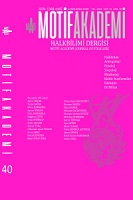MEHMET AKİF’İN SAVAŞLARLA İLGİLİ ŞİİRLERİNDE KUTSALLIĞIN VE FEDAKÂRLIĞIN BEDEN DİLİ
THE BODY LANGUAGE OF HOLINESS AND ALTRUISM IN MEHMET AKIF'S POEMS ABOUT WARS
Author(s): Emel Aydin ÖzerSubject(s): Turkish Literature, Theory of Literature, Sociology of Literature
Published by: Motif Halk Oyunları Eğitim ve Öğretim Vakfı
Keywords: Mehmet Akif Ersoy; Modern literature; Poem; War; Body;
Summary/Abstract: Many things experienced in wars are related to the body, so it can be said that war is literally a struggle between bodies. Here, it is the body that applies the violence and is exposed to it. All these experiences are reflected in the poem, which has a close connection with life. War finds its place in poetry both as a phenomenon and through the depictions of this violent struggle undertaken by bodies. The depictions of the body made by the poet are influenced by his point of view and the poet tries to give a message to the reader and to explain something to him in his depictions from this point of view. If the poet has a feeling of pity for the body he describes, he reflects it with different qualifiers; If he is angry, resentful or sanctifying him, the same body is described with different qualifiers. Thus, the poet's point of view affects the qualifiers and prominent limbs of the body described. Mehmet Akif uses body depictions functionally in his poems about wars as well. Here, we come across two functions such as sacrifice and sanctification. The poet depicts the bodies torn, cremated, frozen and crushed in wars with depictions full of violence and detailing this violence. Here we see that he sanctifies bodies sacrificed in the struggle for independence. Thus, he wants both the sacrifices made not to be forgotten and the reaction to the enemy to increase.
Journal: Motif Akademi Halkbilimi Dergisi
- Issue Year: 15/2022
- Issue No: 40
- Page Range: 1275-1286
- Page Count: 12
- Language: Turkish

